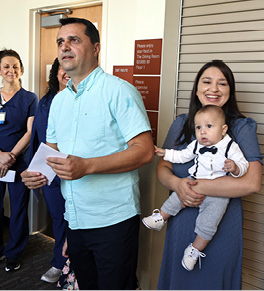Pregnancy Screening Tests
In addition to routine tests, screening tests are usually performed as your pregnancy progresses.
If the results of any screening exam is abnormal, diagnostic testing may be required. If you are nervous or have concerns, don't hesitate to discuss them with your physician.
The most common screening tests include:
Sonography or ultrasound
Ultrasound is used throughout your pregnancy to:
- Detect the cause of any problems, such as vaginal bleeding
- Detect birth defects
- Monitor a condition
- Ensure proper fetal development
- Locate the placenta
- Verify your due date
- Determine your baby's sex
- Detect amniotic fluid volume
- Confirm a multiple birth
During ultrasound, a "picture" of your fetus is generated through sound waves. A full bladder is usually needed, which is usually the only discomfort you will experience.
Nuchal translucency screening
Nuchal translucency screening (NTS) is a test that helps identify pregnancies with a high risk of Down syndrome and other abnormalities.
During the test, a measurement of the fluid underneath the skin fold on the back of the baby's neck is taken. This is called a nuchal translucency. You may also have blood samples taken to analyze hormones and proteins found in the blood of all pregnant women.
Multiple marker genetic screening
Prenatal screening for Down syndrome and other chromosome defects is available to all pregnant women, regardless of age or other risk factors.
On occasion, extra chromosomes can appear on one of the 23 pairs of chromosomes everyone has. This extra chromosome is called a trisomy.
Down syndrome (trisomy 21) is the most common. Infants born with Down syndrome can live to adulthood and experience a range of mild to severe mental and physical disabilities.
Trisomy 13 and Trisomy 18 are more serious. Most infants live only a few days, and most do not reach their first birthday.
Tests for these disorders are done twice:
- Screening tests for trisomies require a special blood test and sonogram for nuchal translucency during the first trimester.
- During the second trimester, a second set of blood tests are done.
The results of these tests will tell your physician whether you should have further diagnostic testing with chorionic villus sampling (CVS) or amniocentesis to rule out a genetic problem.
Alpha-fetoprotein test (AFP)
The alpha-fetoprotein test (AFP) is an optional test that detects neural tube (brain and spinal cord tissue) defects. The test is usually done between weeks 16 and 18.
Defects in the neural tube lead to central nervous system problems. The two most common are:
- Anencephaly, in which babies are born with an underdeveloped head and brain. They usually do not survive.
- Spina bifida, in which babies suffer paralysis in the lower body and legs, as well as a lack of bladder or bowel control. Those who have spina bifida can live a full life span.
Cell free fetal DNA (non-invasive prenatal testing)
Cell free fetal DNA is a test used to detect certain trisomies as early as 10 weeks. The test is done through a blood sample and detects a small amount of DNA that has spilled into the mother's system from the developing fetus and placenta.
It is only recommended for high-risk women with one or more of the following:
- Advanced maternal age (35 years or older)
- Personal or family history of chromosome abnormalities
- Ultrasound abnormality associated with chromosome problem
- Positive genetic screening test
Cystic fibrosis carrier testing
Cystic fibrosis is a disease that causes the lungs and intestines to form a thick mucous that clogs the system. Those who have it rarely live past their forties.
The purpose of carrier testing is to identify couples who have a greater risk of giving birth to a child with cystic fibrosis. Although anyone can be a carrier, the risk is higher for certain ethnic groups, including Caucasian, Ashkenzi Jewish and Hispanic.
This optional test is done through a blood sample. Results are available in one to two weeks.
Fetal fibronectin (fFN) test
The fetal fibronectin test is used to determine your risk of giving birth before 37 weeks (full term). It is normally performed when there are concerns about preterm labor and is not a routine test.
The test involves collecting a small amount of vaginal secretion on a swab between weeks 22 and 35. If the results are positive, your physician may recommend treatment depending on other factors related to your pregnancy.








